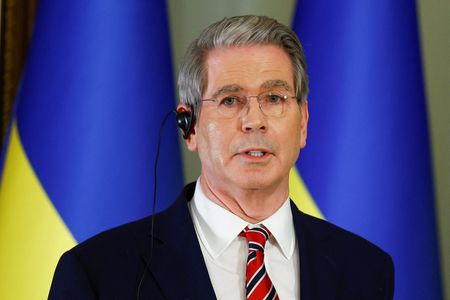By David Lawder and Gnaneshwar Rajan
(Reuters) – Russia could win some relief from U.S. sanctions based on its willingness to negotiate an end to its war in Ukraine, U.S. Treasury Secretary Scott Bessent told Bloomberg Television in an interview on Thursday.
Bessent also said that he would speak with his Chinese counterpart on Friday and urge China to rebalance its economy towards increased consumer spending.
Asked whether the U.S. was prepared to increase sanctions on Russia or reduce them depending on how talks to end the Ukraine war go, Bessent said: “That’d be a very good characterization.”
He added: “The president is committed to ending this conflict very quickly.”
President Donald Trump has said he may meet with Russian President Vladimir Putin this month to discuss ending the war.
Bessent in the interview declined to provide timing for a Trump-Putin meeting, but confirmed that he would not attend next week’s G20 finance ministers and central bank governors meeting in South Africa “due to some domestic considerations.”
During his U.S. Senate confirmation hearing, Bessent said that he would support increasing U.S. sanctions on Russian energy, especially oil majors, if Trump asks him to.
The Treasury chief criticized Ukrainian President Volodymyr Zelenskiy for failing to sign a $500 billion deal to provide critical minerals to the U.S. and for escalating a war of words with Trump. The U.S. president accused Zelenskiy of being a “dictator.”
Bessent said that Zelenskiy “assured me that he would sign the minerals deal in Munich and he has not.” He described the minerals supply arrangement as part of an “elegant plan” to bring Ukraine closer to the U.S. orbit.
Zelenskiy on Wednesday rejected the U.S. demands for Ukraine to repay Washington that much in mineral wealth for wartime aid, saying the United States had supplied nowhere near that sum so far and offered no specific security guarantees in the agreement.
CHINA REBALANCING ARGUMENT
In the “introductory” call with his Chinese counterpart, Bessent said he would urge economic reforms to encourage more domestic consumption.
China’s foreign ministry said Vice Premier He Lifeng would speak with Bessent on Friday in a video call initiated by the U.S. side to communicate important issues in the economic field between the two countries.
Bessent’s predecessor, Janet Yellen, regularly spoke and met with He.
The same argument, that China should rely less on exports for growth, was made repeatedly by Yellen and numerous other U.S. Treasury secretaries over the years. But China has continued its investment and export-led policies.
“The Chinese need to rebalance their economy in favor of consumption – that they are suppressing the consumer in favor of the business community,” Bessent said.
DEBT ISSUANCE UNCHANGED
Bessent said any move to increase the share of longer-term Treasuries in government debt issuance is some way off, given hurdles including the Federal Reserve’s quantitative tightening program.
During Trump’s election campaign, Bessent was critical of Yellen’s heavy reliance on issuing shorter-term bills, which typically carry lower interest rates. He argued that it was aimed at boosting short-term growth, a strategy that Yellen denied.
“That’s a long way off, and we’re going to see what the market wants,” Bessent said when asked about shifting to longer-term issuance. “It’s going to be path dependent.”
He dismissed speculation the U.S. government might revalue its gold holdings in an effort to reduce borrowing needs or to fund the creation of a sovereign wealth fund, the report added.
(Reporting by David Lawder in Washington and Gnaneshwar Rajan in Bengaluru, additional reporting by Joe Cash in Beijing; Editing by Bernadette Baum, Emelia Sithole-Matarise and Andrea Ricci)










